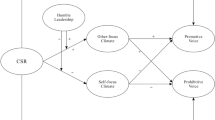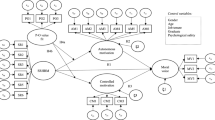Abstract
Although several studies have examined the antecedents of employee ethical voice, how it spreads between colleagues is still being determined. We suggest that the contagion of ethical voice among peers depends on employees’ attributions of coworker ethical voice and their perceptions of organizational politics, which in turn impacts on employees’ moral awareness. We used three waves of lagging survey data from 297 employees in China to test our hypotheses. The results indicate that under a high perception of organizational politics, coworker ethical voice is positively associated with external attribution. Under a low perception of organizational politics, coworker ethical voice is positively associated with employee internal attribution. Rather than external attribution, internal attribution is positively related to moral awareness, which is positively associated with employees’ subsequent ethical voice. This paper aims to extend the current understanding of the contagion of ethical voice among peers and provide relevant insights for organizations to encourage employees to express their ethical voice better.



Similar content being viewed by others
Data availability
The datasets used or analyzed during the current study are available from the corresponding author on reasonable request.
References
Babalola, M. T., Garcia, P. R. J. M., Ren, S., Ogunfowora, B., & Gok, K. (2022). Stronger together: Understanding when and why group ethical voice inhibits group abusive supervision. Journal of Organizational Behavior, 43(3), 386–409. https://doi.org/10.1002/job.2582.
Bocian, K., & Wojciszke, B. (2014). Self-interest bias in moral judgments of others’ actions. Personality and Social Psychology Bulletin, 40(7), 898–909. https://doi.org/10.1177/0146167214529800.
Chang, C., Rosen, C. C., & Levy, P. E. (2009). The relationship between perceptions of organizational politics and employee attitudes, strain, and behavior: A meta-analytic examination. Academy of Management Journal, 52(4), 779–801. https://doi.org/10.5465/AMJ.2009.43670894.
Chen, A., & Treviño, L. K. (2022). Promotive and prohibitive ethical voice: Coworker emotions and support for the voice. Journal of Applied Psychology, 107(11), 1973–1994. https://doi.org/10.1037/apl0001003.
Chen, A., & Treviño, L. K. (2023). The consequences of ethical voice inside the organization: An integrative review. Journal of Applied Psychology, 108(8), 1316–1335. https://doi.org/10.1037/apl0001075.
Chen, A., Treviño, L. K., & Humphrey, S. E. (2020). Ethical champions, emotions, framing, and team ethical decision making. Journal of Applied Psychology, 105(3), 245–273. https://doi.org/10.1037/apl0000437.
Chiaburu, D. S., & Harrison, D. A. (2008). Do peers make the place? Conceptual synthesis and meta-analysis of coworker effects on perceptions, attitudes, OCBs, and performance. Journal of Applied Psychology, 93(5), 1082–1103. https://doi.org/10.1037/0021-9010.93.5.1082.
Desai, S. D., & Kouchaki, M. (2017). Moral symbols: A necklace of garlic against unethical requests. Academy of Management Journal, 60(1), 7–28. https://doi.org/10.5465/amj.2015.0008.
Farrell, D., & Petersen, J. C. (1982). Patterns of political behavior in organization. Academy of Management Review, 7(3), 403–412. https://doi.org/10.5465/amr.1982.4285337.
Ferris, G. R., Bhawuk, D. P. S., Fedor, D. F., & Judge, T. A. (1995). Organizational politics and citizenship: Attributions of intentionality and construct definition. Attribution theory (pp. 231–252). Routledge.
Frömmer, D., Hollnagel, G., Franke-Bartholdt, L., Strobel, A., & Wegge, J. (2021). Linking authentic leadership, moral voice and silence-A serial mediation model comprising follower constructive cognition and moral efficacy. German Journal of Human Resource Management, 35(4), 436–466. https://doi.org/10.1177/2397002220984440.
Gok, K., Babalola, M. T., Lakshman, C., Sumanth, J. J., Vo, L. C., Decoster, S., Bansal, A., & Coşkun, A. (2023). Enhancing employees’ duty orientation and moral potency: Dual mechanisms linking ethical psychological climate to ethically focused proactive behaviors. Journal of Organizational Behavior, 44(1), 157–175. https://doi.org/10.1002/job.2667.
Greenwald, A. G., & Krieger, L. H. (2006). Implicit bias: Scientific foundations. California Law Review, 94(4), 45–967. https://doi.org/10.2307/20439056.
Harrell, C. G., Ferris, G. R., & Dulebohn, J. H. (1999). Political behaviors as moderators of the perceptions of organizational politics—work outcomes relationships. Journal of Organizational Behavior, 20(7), 1093–1105. https://doi.org/10.1002/(SICI)1099-1379(199912)20:7<1093::AID-JOB945>3.0.CO;2-%23.
Harvey, P., Madison, K., Martinko, M., Crook, T. R., & Crook, T. A. (2014). Attribution theory in the organizational sciences: The road traveled and the path ahead. Academy of Management Perspectives, 28(2), 128–146. https://doi.org/10.5465/amp.2012.0175.
Hayes, A. F. (2005). Statistical methods for communication science. Routledge.
Hayes, A. F. (2017). Introduction to mediation, moderation, and conditional process analysis: A regression-based approach. Guilford.
Heider, F. (1958). The psychology of interpersonal relations. Wiley.
Hempel, P. S. (2008). Chinese reactions to performance feedback: Non–task attributions of feedback intentions. Asia Pacific Journal of Human Resources, 46(2), 196–219. https://doi.org/10.1177/1038411108091758.
Huang, L., & Paterson, T. A. (2017). Group ethical voice: Influence of ethical leadership and impact on ethical performance. Journal of Management, 43(4), 1157–1184. https://doi.org/10.1177/0149206314546195.
Igartua, J., & Hayes, A. F. (2021). Mediation, moderation, and conditional process analysis: Concepts, computations, and some common confusions. The Spanish Journal of Psychology, 24, E49. https://doi.org/10.1017/SJP.2021.46.
Jones, E. E., & Davis, K. E. (1965). From acts to dispositions the attribution process in person perception. Advances in Experimental Social Psychology, 2(4), 219–266. https://doi.org/10.1016/S0065-2601(08)60107-0.
Kacmar, K. M., & Carlson, D. S. (1997). Further validation of the perceptions of politics scale (pops): A multiple sample investigation. Journal of Management, 23(5), 627–658. https://doi.org/10.1016/S0149-2063(97)90019-2.
Kelley, H. H. (1973). The processes of causal attribution. American Psychologist, 28(2), 107–128. https://doi.org/10.1037/h0034225.
Kelley, H. H., & Michela, J. L. (1980). Attribution theory and research. Annual Review of Psychology, 31(1), 457–501. https://doi.org/10.1146/annurev.ps.31.020180.002325.
Lee, D., Choi, Y., Youn, S., & Chun, J. U. (2017). Ethical leadership and employee moral voice: The mediating role of moral efficacy and the moderating role of leader–follower value congruence. Journal of Business Ethics, 141(1), 47–57. https://doi.org/10.1007/s10551-015-2689-y.
Li, C., Wu, K., Johnson, D. E., & Avey, J. (2017). Going against the grain works: An attributional perspective of perceived ethical leadership. Journal of Business Ethics, 141(1), 87–102. https://doi.org/10.1007/s10551-015-2698-x.
Martin, R., & Hewstone, M. (2008). Majority versus minority influence, message processing and attitude change: The source-context‐elaboration model. Advances in Experimental Social Psychology, 40, 237–326. https://doi.org/10.1016/S0065-2601(07)00005-6.
Nishii, L. H., Lepak, D. P., & Schneider, B. (2008). Employee attributions of the why of HR practices: Their effects on employee attitudes and behaviors, and customer satisfaction. Personnel Psychology, 61(3), 503–545. https://doi.org/10.1111/j.1744-6570.2008.00121.x.
Park, H., Tangirala, S., Hussain, I., & Ekkirala, S. (2022). How and when managers reward employees’ voice: The role of proactivity attributions. Journal of Applied Psychology, 107(12), 2269–2284. https://doi.org/10.1037/apl0001008.
Parmar, B. (2014). From intrapsychic moral awareness to the role of social disruptions, labeling, and actions in the emergence of moral issues. Organization Studies, 35(8), 1101–1126. https://doi.org/10.1177/0170840613517595.
Podsakoff, P. M., MacKenzie, S. B., Lee, J., & Podsakoff, N. P. (2003). Common method biases in behavioral research: A critical review of the literature and recommended remedies. Journal of Applied Psychology, 88(5), 879–903. https://doi.org/10.1037/0021-9010.88.5.879.
Reeder, G. D., Vonk, R., Ronk, M. J., Ham, J., & Lawrence, M. (2004). Dispositional attribution: Multiple inferences about motive-related traits. Journal of Personality and Social Psychology, 86(4), 530–544. https://doi.org/10.1037/0022-3514.86.4.530.
Reynolds, S. J. (2006). Moral awareness and ethical predispositions: Investigating the role of individual differences in the recognition of moral issues. Journal of Applied Psychology, 91(1), 233–243. https://doi.org/10.1037/0021-9010.91.1.233.
Reynolds, S. J., & Miller, J. A. (2015). The recognition of moral issues: Moral awareness, moral sensitivity and moral attentiveness. Current Opinion in Psychology, 6, 114–117. https://doi.org/10.1016/j.copsyc.2015.07.007.
Reynolds, S. J., Dang, C. T., Yam, K. C., & Leavitt, K. (2014). The role of moral knowledge in everyday immorality: What does it matter if I know what is right? Organizational Behavior and Human Decision Processes, 123(2), 124–137. https://doi.org/10.1016/j.obhdp.2013.10.008.
Tang, Y., Xu, E., Huang, X., & Pu, X. (2023). When can display of authenticity at work facilitate coworker interactions? The moderating effect of perception of organizational politics. Human Relations (New York), 76(1), 27–52. https://doi.org/10.1177/00187267211031834.
Trope, Y. (1986). Identification and inferential processes in dispositional attribution. Psychological Review, 93(3), 239–257. https://doi.org/10.1037/0033-295X.93.3.239.
Trope, Y., Cohen, O., & Maoz, Y. (1988). The perceptual and inferential effects of situational inducements on dispositional attribution. Journal of Personality and Social Psychology, 55(2), 165–177. https://doi.org/10.1037/0022-3514.55.2.165.
Vigoda-Gadot, E. (2007). Leadership style, organizational politics, and employees’ performance: An empirical examination of two competing models. Personnel Review, 36(5), 661–683. https://doi.org/10.1108/00483480710773981.
Wellman, N., Mayer, D. M., Ong, M., & DeRue, D. S. (2016). When are do-gooders treated badly? Legitimate power, role expectations, and reactions to moral objection in organizations. Journal of Applied Psychology, 101(6), 793–814. https://doi.org/10.1037/apl0000094.
Xing, L., Sun, J., Jepsen, D., & Zhang, Y. (2023). Supervisor negative feedback and employee motivation to learn: An attribution perspective. Human Relations, 76(2), 310–340. https://doi.org/10.1177/00187267211038514.
Zhao, H., Chen, Y., & Liu, W. (2023). Socially responsible human resource management and employee moral voice: Based on the self-determination theory. Journal of Business Ethics, 183(3), 929–946. https://doi.org/10.1007/s10551-022-05082-5.
Zheng, Y., Graham, L., Farh, J., & Huang, X. (2021). The impact of authoritarian leadership on ethical voice: A moderated mediation model of felt uncertainty and leader benevolence. Journal of Business Ethics, 170(1), 133–146. https://doi.org/10.1007/s10551-019-04261-1.
Zheng, Y., Epitropaki, O., Graham, L., & Caveney, N. (2022). Ethical leadership and ethical voice: The mediating mechanisms of value internalization and integrity identity. Journal of Management, 48(4), 973–1002. https://doi.org/10.1177/01492063211002611.
Zhou, Q., Mao, J., Liu, X., & Ning, X. (2022). The impacts of distinct motives on promotive and prohibitive voice: The differential moderating role of perceived voice level. Journal of Business and Psychology, 37(3), 601–613. https://doi.org/10.1007/s10869-021-09760-5.
Funding
This research was supported by National Natural Science Foundation of China (72071049) and Philosophy & Social Science Foundation of Guangdong Province (GD23XGL021;GD23XGL024).
Author information
Authors and Affiliations
Corresponding author
Ethics declarations
Conflict of interest
On behalf of all authors, the corresponding author states that there is no conflict of interest.
Ethical approval
All procedures performed in studies involving human participants were in accordance with the ethical standards of the institutional and/or national research committee and with the 1964 Helsinki declaration and its later amendments or comparable ethical standards.
Informed consent
Informed consent was obtained from all individual participants included in the study.
Additional information
Publisher’s Note
Springer Nature remains neutral with regard to jurisdictional claims in published maps and institutional affiliations.
Rights and permissions
Springer Nature or its licensor (e.g. a society or other partner) holds exclusive rights to this article under a publishing agreement with the author(s) or other rightsholder(s); author self-archiving of the accepted manuscript version of this article is solely governed by the terms of such publishing agreement and applicable law.
About this article
Cite this article
Zhao, N., He, B. & Sun, X. The contagion of ethical voice among peers: an attribution perspective. Curr Psychol (2024). https://doi.org/10.1007/s12144-024-05958-x
Accepted:
Published:
DOI: https://doi.org/10.1007/s12144-024-05958-x




